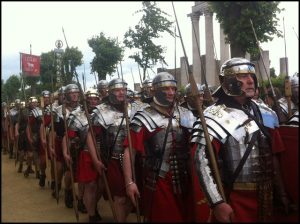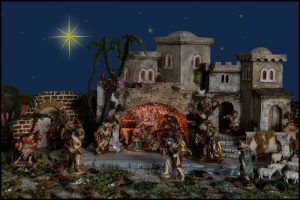_____Once there was a man named David who had great cause to celebrate in the middle of winter. A young married man, at long last after three daughters, he rejoiced that his wife had given birth to a son. The excitement of the baby’s arrival warmed the small household, so much so that David missed a night of work. But he did not regret it. The sight of his tiny son delighted him, and his joy poured out on his family.
_____The next day, when he joined his co-workers he overflowed with his news. He expected to be the center of attention, since his friends were well aware of the pending birth. He looked forward to telling them all the details of his son’s arrival, the reactions of his daughters, and the laughter of his wife.
_____His friends greeted him warmly, but before he opened his mouth, Matthew spoke up.
_____“You should have been with us last night! It was unbelievable! If I hadn’t seen it myself– ”
_____“My wife had our baby,” cut in David.
_____His three friends exchanged smiling glances, and he suddenly felt left out. Those flashing looks spoke a language he could not comprehend.
_____“Ah. Your baby,” said Matthew. “Was it another girl?”
_____“No!” David’s face grew bright with joy. “A boy! A son was born onto us!”
_____Those special smiles appeared again. David had no doubt that his friends were pleased for him, and yet he felt as if his news was merely an echo in their heads, a faint replication of something bigger. Still, the other men congratulated him and clapped him on his shoulder.
_____“So what was it that I missed last night?” he asked as they walked together toward their flocks.
_____They poured out a strange tale of bright lights and singing, each jumbling his impression on top of another’s. It thoroughly confused David. Privately, he suspected they had indulged in a night of drinking in his absence. So he let the story slide by him, turning his thoughts to his new-born son.
_____The days turned happily for him, watching his son grow. The tiny form fleshed out. The baby smiled at the sound of his voice, an exciting delight to the young father. David felt certain he could see his own features in the face of his son.
_____But one day, the sunlight of his joy clouded over.
 _____Soldiers marched into town, foreign troops employed by the government. Their grim faces cut through the community. They rode in on a proclamation which devastated the town. All the male children under the age of two were to be killed. The suddenness of the order caught the townspeople unprepared. Toddlers and infants were snatched away before anyone could think.
_____Soldiers marched into town, foreign troops employed by the government. Their grim faces cut through the community. They rode in on a proclamation which devastated the town. All the male children under the age of two were to be killed. The suddenness of the order caught the townspeople unprepared. Toddlers and infants were snatched away before anyone could think.
_____David stood in shock, tears falling unnoticed. His wife screamed and wept, clutching at him. He watched the slaughter as if turned to stone, as if lost in a dark moonless night. His son was gone.
_____Empty years rolled over him. He went through the motions of his life, providing for his family, growing more prosperous. But it was all hollow for him. His joy had been killed with his son and nothing could touch his heart. His daughters grew and married, but with his duty done toward them, he rarely saw them. His wife maintained the house in silence, but her joyful voice had died with their son. And when the day came that she died of an illness, he dutifully buried her in his silent way.
_____Winter came again and he was alone.
_____He stood one night outside his house looking at the night sky. For once, cutting across the years of stony emptiness, he remembered the night his son had been born. The sky had been bright that night, and for many nights afterward. Stars like jewels in crowns had hung over the small town. To the young man he had been they were like a treasure for the king of his heart, that baby boy of his.
_____Suddenly, the present rushed up to him. Footsteps crunched their way up the street toward his house. He turned to go in, to shutter up the empty house and close out the world.
_____“Pardon me.” The voice halted his escape. Reluctantly, he turned to face the man.
_____He saw a young man, perhaps the same age he had been on that long-ago night. The cold winter wind whipped around the man’s travel-worn coat and chaffed the face that smiled at him.
_____“What do you want?” David’s voice lept out harshly, perhaps from unuse, perhaps from resentment.
_____The stranger’s smile remained. “I’ve arrived late in town. Would you be able to put me up for the night?”
_____David wanted to refuse, but the emptiness waiting for him inside suddenly hurt. “Yes,” he answered gruffly. “Come in.”
_____The stranger followed him in. “Blessings on this house,” he said as he stepped over the threshold.
_____The words stabbed David. Tears pricked his eyes. His blessing had died long ago. He choked down the rising grief.
_____He set about his duties as host. He built up the fire on the hearth, provided his guest with food, pulled out extra bedding. Small bits of conversation flowed, words of little matter filling in the corners of the gloomy house.
_____The stillness of a late hour arrived and David now wanted to escape to his sleep of loneliness and grief. Conversation had fallen off for a few moments. The host had risen to his feet when the stranger spoke again.
_____“Shall you go up to the city for the Festival of Dedication?” he asked.
_____David stopped, shocked. The question cut across his life with strange power. The Festival of Dedication? He had not thought of it in years. He looked down at the stranger in astonishment.
_____The younger man looked up at him with bright, understanding eyes. Slowly a smile grew on his face.
_____“You have not celebrated it for years.”
_____It was not a question, but it was said gently. It weakened David’s knees. He sat down again. “No, I have not celebrated it in years.”
_____The stranger leaned forward eagerly, his eyes on the older man’s face. “But think of it. What a thing to celebrate! The temple had been defiled, idols placed in the holy grounds. And yet those young men refused the king’s order to worship the idols! Yes, they were killed for it. But within three years, the foreign images were thrown out, and God’s place was purified again. The Lord honored those who honored Him. A great darkness had covered the Holy of Holies, but it was driven out! Is that not cause to celebrate?”
_____David sat, looking at the darkness in his own heart. His own holy of holies had been lost and defiled. A tear slid down his cheek and fell, hot, on his hand. Silence filled the air.
_____“They know not, neither will they understand. They walk on in darkness. All the foundations of the earth are out of course.”
_____The stranger’s voice whispered at the glowing coals, warm like them. David glanced up startled. The young man sat staring at the drowsing fire, having spoken more to himself than to his host.
_____“Who are you?” asked David suddenly. “Why are you here?”
_____The young man’s eyes met his, eyes bright with joy and life. The warmth of the fire flowed from guest to host. His smile broke in the shadowed room like a suddenly uncovered lamp.
_____“Ah,” he said, “just visiting my past. I was born in this town.”
_____Then he rose to his feet and the conversation was at an end.
_____When morning came, David’s visitor went on his way, thanking the older man for his hospitality.
_____David sat by his door through the morning, thinking of the stranger. He was not sure why the young man had had such an effect on him. He felt restless, as if afflicted by a persistent itch he could not reach. He looked at the sullen winter landscape and suddenly decided to go up to the city for the Festival.
_____It had been a long time since he had walked the streets of the city. He followed the streams of people moving up the hill toward the temple. Suddenly, he lifted his eyes from the paving stones to see the sun gleaming on the walls of the temple. He stopped in wonder. He had been carrying darkness around inside him, but now sunlight broke through. The words of the psalmist suddenly echoed in his head: “God standeth in the congregation of the mighty; he judgeth among the gods.” How had he forgotten? David wondered. It was not enough to have done his duty. He remembered now that there had once upon a time been more.
_____A cluster of people gathered at Solomon’s Porch caught his attention. “How long are you going to keep us guessing?” shouted someone at the man in the center of the crowd. “If you’re the Messiah, the Christ, tell us straight out!”
_____“I have told you, but you don’t believe,” answered the man. David stopped in shock again. He knew that voice! It had spoken to him in the dim shadows of his home. David stared at the man as he continued. “Everything I have done has been authorized by my Father, actions that speak louder than words.”
_____The young man turned and suddenly he was looking straight at David. “You don’t believe because you are not my sheep. My sheep recognize my voice. I know them and they follow me. I give them real and eternal life. No one can steal them from out of my hand.”
_____David lost track of the disputation as it continued. He stood where he had stopped. Wild, disconnected thoughts bounced around in his mind. This young man. He had said he had been born in David’s town. But – David looked at the stranger keenly again – then why was he alive? The young man was of an age ….
_____The young man was the age David’s own son should have been.
_____His son! That tiny delightful form that had been stolen, snatched from his hands. His heart began to crack into fragments as he stared at the young man. “Why are you alive and my son dead?” he thought, as if his inner voice could carry over the angry clamor of the crowd.
_____The voice of the young man cut through his thoughts. “Is it not written in your law, in the Psalms ‘I said, you are gods’? If the Lord called them gods, those to whom the word of God came – and if scripture cannot be broken – then why do you say to the one whom the Father has sanctified and sent into the world ‘You blaspheme!’ Is it because I have said I am the Son of God?” A light run of laughter escaped the young man. “If I do not do the works of my Father, do not believe me. But,” and suddenly the eager urgency David had heard in the voice over the coals rang out across the courtyard, “if I indeed do the works of my Father, even though you do not believe me, believe the works. For in them you may know, and believe, that the Father is in me and I in Him.”
_____Shouts of anger flew up like startled pigeons and the crowd pushed in on the young man. The mob swirled about David, who felt he had been planted on the spot. “The Son of God?” he thought, amazed.
 _____Shattering through his memories, through the noise of the crowd around him, he heard the long-ago words of his fellow shepherds, the excited words that had jumbled as a clutter one upon another so that he had never heard them until that moment.
_____Shattering through his memories, through the noise of the crowd around him, he heard the long-ago words of his fellow shepherds, the excited words that had jumbled as a clutter one upon another so that he had never heard them until that moment.
_____“An angel of the Lord!” “To you is born this day in the city of David a savior who is Christ the Lord!”
_____The broken pieces of his heart fell away and tears fell from his eyes. The Son of God! If it had been God’s son who had died on the Roman swords instead of his own, how much darker would the world be?
_____He lifted his eyes. The sunshine gleamed on the stones of the temple. The mob had disappeared from Solomon’s Porch. David remembered the Festival of Dedication. Had he made an idol of his infant son? he wondered, walking toward the inner courts. The sun felt warm on his face, its light brighter than usual in winter.
_____The temple had been purified. The Holy of Holies was no longer covered in darkness. And the Son of God walked among men. David smiled, with joy at last, and went into worship the Lord.
Copyright 2012 Sarah Beach


Pingback: A Story for Christmas | ScribblerWorks News
Pingback: Where Is the Christian Short Fiction Market? | ScribblerWorks News